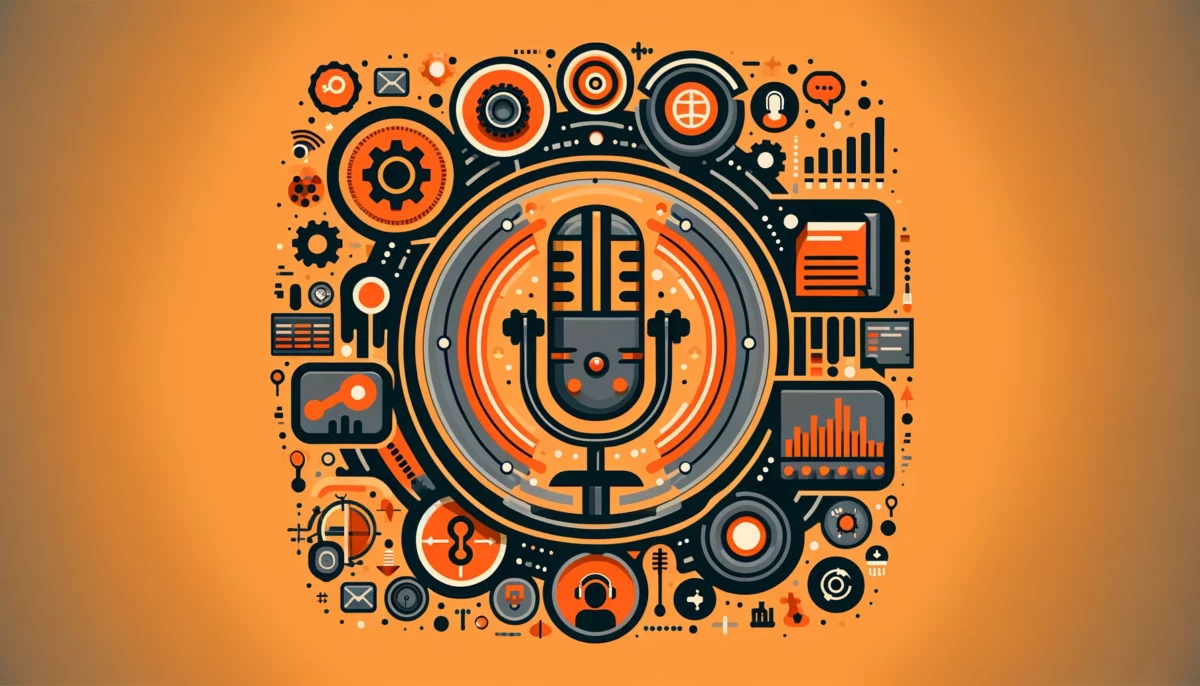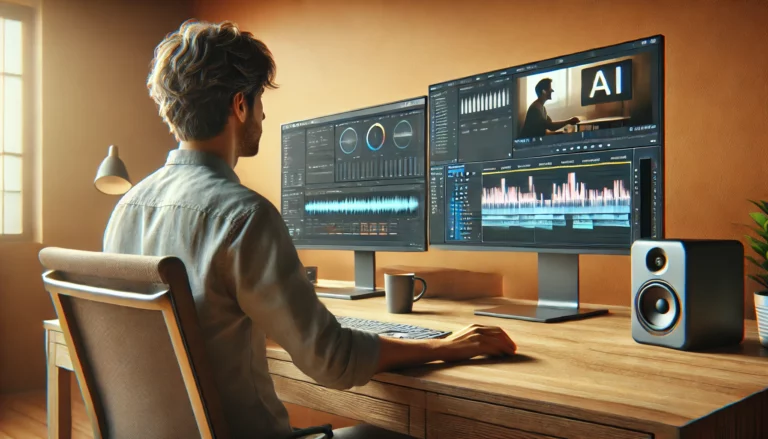Artificial intelligence (AI) has gained popularity in various applications, transforming how we interact with technology in businesses. In medicine, AI has revolutionized the early detection of diseases such as cancer, using advanced algorithms to analyze medical images and accurately diagnose. In the financial sector, AI has been used to predict market trends, identify fraud, and perform risk analysis more efficiently and accurately. Even in our homes, artificial intelligence has been integrated into smart appliances and devices to make our lives easier, from virtual assistants on smart speakers to security systems that use facial and voice recognition to ensure home security.
In the voiceover and voice-acting industry, artificial intelligence is increasingly important in generating synthetic voices for various commercial and creative purposes. Nowadays, multiple sites provide AI voices generated in minutes, but can these AI voiceovers be used for commercial purposes?
This guide explores the ethical use of AI voiceovers and their growing applications in business, highlighting the benefits and challenges of using them for business purposes.
What are AI voiceovers?
Artificial intelligence (AI) voiceovers represent a significant advancement in speech technology and synthetic voice generation. These technologies use advanced algorithms and machine learning models to convert written text into human speech naturally and realistically.
Deep language models are the basis of AI speech, being neural networks trained to understand and produce human language like a human would.
Generating AI voices and speeches through text input is known as Text-to-speech AI. The text is processed using the deep language model, which interprets the content and generates an internal representation of the text in numerical vectors. These vectors then create an audio sequence corresponding to the input text.
To make the generated speech sound as natural as possible, deep language models can also incorporate information about the context and intent of the text. For example, if the text is a question, the model can modulate the intonation to make it sound like a question.
In addition to speech generation, AI voiceovers can also include features such as the ability to change the gender, age, or accent of the generated voice.
Commercial uses of AI voiceovers
In commercial use of artificial intelligence (AI) voiceovers, respect for copyright and intellectual property is a fundamental aspect that companies must consider. Misusing copyrighted content can lead to legal disputes and damage the company’s reputation.
Obtaining the rights to use copyrighted content in AI voiceovers is crucial to ensure copyright compliance. In addition, verifying that AI’s voices do not infringe on third parties’ rights, such as the right to image or privacy, is crucial.
In some cases, controversies have arisen when companies have used the voices of celebrities or public figures to create AI voiceovers without their permission. This unauthorized use raises questions about individuals’ intellectual property, image rights, and the ethics of using someone’s voice without their consent.
One of the best-known cases is that of actress Scarlett Johansson, who filed a lawsuit against a company that employed her voice and her image to create a chatbot without her consent. Johansson argued that her voice and image were part of her property and that unauthorized use violated her intellectual property rights.
Another case is that of the Canadian singer Avril Lavigne, who sued a technology company for the unauthorized use of her voice for a synthetic voice in a karaoke application. Lavigne argued that the company used her voice without permission, violating her intellectual property and privacy rights.
Complying with applicable laws and regulations is essential to ensure these technologies’ ethical and legal implementation. But, one of the main problems is the lack of clear legislation on using synthetic voices and voice cloning. In many countries, there are no specific laws regulating the use of synthetic voices of public and private people, which could lead to complicated legal situations in the future.
Without clear regulations, it is difficult to determine who is responsible if legal or ethical problems arise related to these technologies. When writing this post, there are ethical guidelines such as those of the United Kingdom, the European Union, or Japan.
Ethical and Legal Considerations
Besides obtaining the necessary commercial rights to use AI voices, it is essential to consider industry-specific regulations. For example, AI voiceovers must comply with misleading or manipulative advertising regulations in the advertising and marketing sector. Companies must ensure that AI voiceovers used in ads are not deceptive or raise false consumer expectations. In the healthcare sector, AI voiceovers used in medical applications must comply with medical information security and privacy regulations. This includes ensuring that AI voiceovers used to provide medical information meet accuracy and reliability standards set by regulatory authorities.
Transparency in the use of AI voiceovers is essential to guarantee user trust. Companies must inform users when interacting with an AI-generated voice instead of a human voice. This is especially important when AI voice can influence users’ decisions or actions, such as in virtual assistant systems or customer service interactions. By providing transparent information about AI speech, companies can help users better understand how these technologies work and make informed decisions about their use.
AI voiceovers can be a powerful marketing and business communication tool, but their use must be done carefully and carefully.
AI Voice Applications in Businesses
The AI voice-over applications in business have revolutionized how companies communicate with their audiences and customers. Thanks to advances in this technology, companies can leverage AI voice overs for various business purposes.
Advertising: AI voiceovers can be used in radio and television advertisements to convey messages effectively. However, AI voices may lack authenticity and emotional connection compared to human voices, resulting in less effectiveness in getting the message.
Corporate videos: AI voiceovers can provide clear and professional narrations. This is especially useful in explainer or training videos, where a clear, well-articulated voice can improve the viewer’s understanding and retention of the content. Although AI voices lack the warmth and emotion a human voice brings, it can result in a poor viewing experience.
Social Media Videos: AI voiceovers are used in videos to increase audience engagement and participation on social media. These synthetic voices can add a personalized touch to videos, making them more attractive to viewers.
E-learning: In online learning, AI voiceovers enhance the learning experience by providing easily accessible and instructive content. However, AI voices may lack the expressiveness and adaptability that a human voice offers, resulting in a less engaging learning experience for students.
Dubbing: AI voiceovers are used to create foreign language versions of films, series, and videos, offering an efficient and high-quality solution for producing multilingual audiovisual content. But despite their efficiency, AI voices can struggle to replicate particular regional accents or dialects accurately.
Video games: In video game development, AI voiceovers are used to create voices for characters, narrators, and dialogue systems, offering a more immersive and dynamic gaming experience for players.
In all cases where artificial intelligence is used to generate voices, the most significant disadvantage is that AI voices may lack the authenticity and emotional connection a human voice offers.
AI voiceovers offer several significant benefits for companies looking to improve their communication. One of the important advantages is that AI voiceovers can provide greater scalability and efficiency compared to human voiceovers, which can be especially useful for companies with large volumes of audio content.
However, companies should carefully weigh the benefits and considerations mentioned above when using AI voiceovers for business purposes to determine if this technology suits their needs. If implemented effectively, AI voiceovers can be a powerful tool to improve a company’s communication, offering a consistent voice at any time.
Interested in exploring AI voiceovers with a partner that prioritizes ethical practices and custom solutions? Just reach out to one of our friendly team members so they can guide you in the best option. If the AI voiceovers don’t fit your needs, you can hire the best human voice overs at Bunny Studio. Create a project now or chat with us here.









